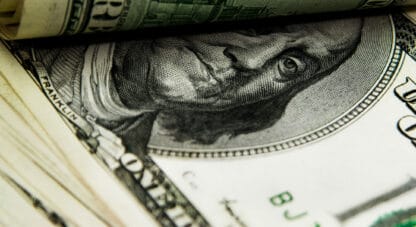Podcast: Play in new window
- German Producer Price Inflation up 45%
- World Bank warns of devastating recession if rates go too high
- 30 Year Treasury purchased in 2020 now down 40%
Hoping For A Less Worse Tragedy
September 21, 2022
“What is clear in my mind is that uncertainty is a factor not adequately priced into the market. Uncertainty is a factor not adequately priced into the market. And I’m talking about international relations uncertainty, inflation uncertainty, domestic and global recession uncertainty, November election uncertainty. The list goes on and on.” — David McAlvany
Kevin: Welcome to the McAlvany Weekly Commentary. I’m Kevin Orrick, along with David McAlvany.
Well, our guest last week, Dave, Andrew Smithers, he brings 85 years—in fact I think on the 21st he turns 85 years old—but he brings a grand narrative to the stage. When you talk to somebody who’s lived many decades of learning—I’m not talking about just living many decades, but actually many decades of living and learning and writing and testing—there really is a grand narrative. It’s almost like a long play, isn’t it?
David: It is. Somebody last week said, “It’s not just experience, but it’s experience that you’ve reflected on that matters.” And there’s plenty of people with experience who have a hard time still pulling themselves out of a ditch. And if you can figure out how the world works, and then do something with that experience that you’ve reflected on, boy, that’s important.
Grand themes, he’s got a few. There’s so much in terms of the details, whether it was a conversation last week or the details that we look at every week. A story with a compelling arc is something that is easy to return to when I think of grand themes. How often have you heard it? At times, I think grand themes, like the theme of inflation— It can almost feel like a rehash of a repeat of a tired, heard-it-a-thousand-times tale, but inflation has an arc to it. It is a compelling chronological plot. It’s thickening now in real time, but at certain points can feel like there’s nothing left to be said that hasn’t already been said.
In theory, inflation is highly problematic. In actuality, it’s both problematic and painful to the individual person. I hope we don’t become desensitized to it, and forget that inflation matters because people do. So when we see inflation, when we see it’s counterpart or colleague devaluation, it may seem to be mathematical, but there’s an ethical component to it as well. And of course there’s a sociological and political component when we think of ramifications that are also attached. I see the epitome of high drama in the inflation arc, in the inflation story. It’s not a mere statistic, whether you’re talking headline or core.
Kevin: Well, and there’s a different way to look at it. I think of it as this thief that just continues to come in and quietly steal and hollow out the meaning of savings, hollow out the meaning of the ability to pay for food. Or you just look at the last 100 years, a loaf of bread was six cents a loaf, Dave, a hundred years ago. Now it’s five or six bucks a loaf. It’s almost 100-fold larger. Why is that? Why do I have to make more and more money every year? You talked about grand themes. Shakespeare, he wrote about some pretty tragic characters like Macbeth. He’s talked about the meaninglessness of life. Well, inflation does that too, doesn’t it?
David: Sure. And to stitch together the conversations we’ve had with Smithers, going back a few years, take the risk of inflation, which is a temporary small cut, to the catastrophic and inevitable decline of a market going from being overvalued to being undervalued. And this is something that can be back tested and, to a large degree, predicted. Not precisely when, but that it will happen. We have a return to reasonable value in the equities markets. And as far as Smithers is concerned, you take the risk of inflation, and cash is a superior alternative to that inevitable and catastrophic decline in something that is overpriced and is sure to go down in value.
So inflation, is it stale to you? I think my kids have probably heard the story 1,000 times, so maybe it’s stale to them. Perhaps the trouble with the tale is more personal. Perhaps the trouble is with me. Shakespeare, “Life is a tale, told by an idiot, full of sound and fury, signifying nothing.” So maybe we can set aside the idiot part for a minute, but I think the sound and fury, not all details are dramatic. That doesn’t mean they are insignificant.
Kevin: Well, and we just heard Morgan tell us today that German PPI, producer price inflation, okay, that’s up 45% year over year. 45%. Dave, what’s going on? That’s not insignificant at all. You talk about drama.
David: And with the increase in energy costs, Europe has to then consider what kind of activity they’re going to allow. Basically regulating the amount of energy that can be used by an individual or corporation. These are details that do end up mattering. I think minutia we see on a week to week basis, there’s variables and details that come through and across our desk and across the screen. Daily price action, which has its interplay with profit and loss statement on any timeframe. Daily, weekly, monthly, quarterly, annually, there’s gyrations that we have to keep in mind. This last week was a perfect case in point. We have a hyper-financialized, derivative-amped system. Options and futures expiration now matter more than ever, as we saw last week. Sound and fury, they do signify something.
Kevin: Yeah. But we have gotten so used to depending on the Fed and looking at what the Fed’s going to do. Are they going to raise rates more? When are they going to lower the rates? They must be in control. And it reminds me, it’s almost as if a person on the Titanic walks up to the captain after they’ve announced that they’re sinking, and asks, “When are we going to get to New York? When are we going to get to America?” And what’s the captain to say, Captain Powell in this particular case, because really there’s a point where they can’t control it?
David: Well, and as I understand the telling of that story, the captain didn’t believe that there was a problem even after they hit the iceberg.
Kevin: Good point. He was in disbelief himself. It’s hard to get your head around something you cannot conceive of.
David: He understood the engineering. He understood that this was the best-engineered ship in the history of naval—
Kevin: Ship building.
David: Right. So yeah, in the details or monetary policy expectations, you’ve got the official pronouncements. How much is Powell going to move rates? I mean, this week is another key to market contentment, or perhaps, by midweek, perturbation. There is fiscal policy politics, deficit numbers. Even though we saw an increase in revenue, we still saw a bigger increase in spending. There’s employment, there’s wages, there’s all the economic indicators—back to the minutia—take the market’s temperature, indicate health or sickness, and they’re stretched across a number of timeframes. It’s easy to get lost in the details. Even feels like those details run together. If you ever been in a conversation you weren’t particularly interested in. These uninteresting tidbits, you begin to lose concentration over. So Arthur Conan Doyle, I think, was right, though, saying, in Sherlock’s voice of course, “There’s nothing more deceptive than an obvious fact.” So I think we do have to look at the facts very critically and see what is presented on purpose, and what it actually means. We have to critically engage the particulars.
Kevin: Well, and Smithers last week, he talked about consensus thinking, and that’s a dangerous thing because if consensus thinking turns out to be wrong, oftentimes it takes a while to get your head around that and come to terms with being wrong.
David: It’s every week I see some sort of an article, whether it’s the Wall Street Journal or the Financial Times or another source, which is referencing a group of economists. And I don’t even remember what the statistic was about, but, “45 out of 50 economists said, blah, blah, blah.” And that was in an article I read this weekend. And my initial thought was, “If 45 of 50 economists are in agreement, you’ve got one of the surest bets on the planet. Just go the opposite direction.”
Last week we had $3.2 trillion of derivatives that expired on Friday. So again, we come back to this hyper-financialized, derivative-amped system. What happened last week was exaggerated by the fact that we’re on a timeframe for these crazy products. The market was upset, in large part because it had to come to terms with being wrong. Last week’s conversation with Andrew underscored some of the issues with current consensus thinking, leading to the misplaced faith—misplaced faith—in things like the efficient market hypothesis.
Prices are supposed to reflect collective wisdom. Perhaps collective belief is more accurate. And when we put it in those terms, in terms of collective belief, we have to look and say the bona fides of belief are not always equal. So the accepted narrative now is that inflation is going to peak quickly if it hasn’t already peaked, and then the Fed is back to accommodating with lower rates. And yes, we’ve only had three months of quantitative tightening, but it will prematurely end. So we’ve got an increase in rates in the short run, and in the long run, which is really only 12 to 18 months, we’ll be back to a declining interest rate environment.
Yield curve inversion, where the short rates are higher than the long-term rates, seem to confirm, even act like a crystal ball for gazing into the Fed’s collective mind and the market’s anticipation of their decisions. So what was interesting last week is that we had the goal posts moved. Rates were supposed to be in decline in 2023, right? It’s what they saw. No. Now it’s going to be an increase in rates and they’ll finally drop in 2024 instead. Same story, inflation is an aberration. It’s costs are almost completely accounted for, central banks have got this one.
Kevin: Well, and the way you see that is you see what the short-term rates are doing versus the longer bonds. And it was brought up in the meeting just over the last hour when we were meeting together, that this may truly be a signal from the market that they are expecting a crisis, that the Fed will only be able to raise rates for so long before they have an emergency reaction to the downside. So look at the market, look at the declines in the market just over the last week.
David: I liked the Wall Street Journal’s comment, “Investors made a huge mistake over the summer, misreading the economy and even worse misreading the Federal Reserve,” says the Wall Street Journal. “The scale of the mistake became obvious on Tuesday, and led to the biggest one-day selloff in more than two years. But the error, a belief in peak inflation after reaching peak rates early next year, continues to underpin bond, stock, and futures prices.”
Kevin: Yeah. I listened to an interview with Biden, and he was saying, “Gosh, at least inflation’s not spiking. It’s still at 8.3.” And even the guy who was interviewing him—and they pick very carefully these days who interviews Biden to help him through every answer. But he says, At least it’s not spiking.” Even the interviewer had to say, “Well, yeah, but 8.3% inflation?” But now we’re talking something that’s more diabolical. It’s now getting to the core. It’s getting to wages. It’s getting to things that never reverse. Right?
David: That’s right. The unexpected jump in inflation was with the core number, not the headline. The headline is almost like it sounds, what people pay attention to. Core is when you strip out the more volatile pieces of food and fuel. And when core begins to increase, as it did, again, up 0.6 for the month, so on a 7% annualized rate, it suggests an already pervasive spread of inflation to those less volatile and more sticky areas of pricing—again, back to wages, services, things like that. And that challenged the market’s belief. That was the volatility point last week.
So with the surprise core number, where again, it turns out inflation is more pervasive than previously thought. Given that number and proximity to the triple witch on Friday—triple witch is the expiration date for stock options, for index futures, and for index options—they all expired back to that $3.2 trillion in derivative products which was expiring on Friday. The expiration of those, that was a reversal of— That’s what ensued. Massive, massive equity market volatility. Core running at a 7% annual rate set many a nerve on edge, further pressuring the Fed to lift rates farther and faster, which we get to see this week.
Kevin: As you look at managing money, Dave, and I’m glad I don’t, actually. I just mainly work in the gold. I leave that to you. You can look at money management, but there are little things that you can do that most people maybe don’t even look at. And that is, what time does something happen in the market trading day. In other words, there’s some things that trade all day long, and then there’s other things that sort of square up at the end of the day. And I know you’re particularly interested in the last 20 to 30 minutes in a market trading day. Why is that?
David: Well, and it’s really dealing with structure more than it is time because we’ve talked about ETFs as great way to buy things, to buy them inexpensively, to buy a basket of assets. They’ve in large part become the prime competitor with mutual funds. But for some products it’s just not appropriate because you don’t have liquidity on the underlying asset that is implied by the point and click of the mouse to either buy or sell the asset in question. There is this issue at the end of the day; many exchange traded funds settle up, either creating or destroying baskets of the underlying assets or something equivalent by proxy, and it happens there in the last 20, 30 minutes.
So that is an intriguing aspect of trading to me, late in the day, throughout the week, last 20, 30 minutes, it’s kind of position squaring by ETFs. Mutual funds can trade positions all day long, and then that fund, which hasn’t shown any price changes all day, it re-prices after the close. ETFs have price fluctuations all day from the buying and selling, and then the market makers, if you will, have to come in and create or destroy baskets of those assets to make sure that there’s enough there to represent the dollars invested in the ETF.
The popularity of ETFs exaggerates the late-in-the-day momentum trends, and last week was particularly interesting. You get to the end of Tuesday, and momentum just keeps on going into the close. It’s weak, weaker, weakest—not as an expression of hyperbole, but just this reality that market structure is important beyond the component parts. The way trades are settled these days, on a positive day it might help in the last 20 or 30 minutes, and on a negative day, it can hurt you too.
Kevin: Well, that’s sort of the micro timing of things, too. That’s looking at small snippets of time. But did you read what the World Bank said? The World Bank, they’re looking at the larger economy. We’re not talking just the US economy. They’re talking about worldwide coordination of what the central banks are doing because they’re scared.
David: Well, the push for central banks to coordinate their efforts sounds like 2008, 2009 all over again, where we’d better be on the hotline and we’d better be talking. Last week, the World Bank was out warning central banks to not raise rates too much and throw us into a devastating recession. They’re not worrying about a devastating recession, they’re worried about a devastating depression. Their advice is, “Coordinate your actions so that less tightening is necessary.” But I’ll be honest, I think things are pretty well synchronized. If they were any more synchronized, I think you’d have central bankers that looked like the artistic swimmers. Synchronized swimming in the monetary deep end of the pool.
Kevin: That’s a bad picture of bankers.
David: Powell with the nose plugs, so he doesn’t take water in, inverts himself. Everyone eased in unison, everyone is tightening in unison. The inflation factor is not country specific, it’s structural, it’s global in scope. To me, there’s a lot of synchronization here. It’s because they’ve gone to the same schools, they’re playing by the same playbook, which is why last week’s conversation with Andrew Smithers was so important. We’re dealing with consensus thinking amongst policymakers, and it’s a shared, it’s a common textbook knowledge. The reference points are the same. The articles of faith are the same, and the belief in a particular reality is the same.
Kevin: Hasn’t the reality, though, been fueled by credit growth? The economy, the models that we’ve been using for decades now, have been really built on the knowledge that people are going to borrow more and more and leverage more and more. Isn’t that what the World Bank’s looking at right now and going, “Wait a second, we don’t have that anymore”?
David: I’d say it’s been validated by that. We’ve had decades of validation, but how do you feel after some strange substance has entered your system? “Well, maybe I feel good.”
Kevin: That’s not organic. It’s not organic, it’s artificial.
David: So appreciate that the tightening of financial conditions in a highly leveraged financial system has immediate ramifications, both for asset prices and the broader economy. That is not at all to suggest that we shouldn’t tighten financial conditions, that we shouldn’t have QT, we certainly should, we need to shrink the balance sheet, but it’s just that it’s consequential. And there’s not much room, frankly, to push rates higher before something in the system breaks. And a part of that is because we’ve abused this for so long. We’ve validated economic growth using credit growth as the means to get it, that now when there’s a reversal in credit growth, we don’t get economic growth. And yes, we’re concerned about recession or worse.
That’s the World Bank saying, “Guys, be careful. Be very careful. You could throw us into a real state.” And yes, that’s true, but what are your options here? What are your options here? Because you can continue to abuse the credit system, create greater excess, and we can kind of play that out further, whether it’s the disconnect between rich and poor—those who have assets that are continuing to inflate and those who have none, but do deal with the cost of the price of goods and services rising. That social tension, these are realities. We can continue on that road or we can tighten the credit markets, and that does have a real cost. If you have assets and you benefitted on the upside, guess what? Credit contraction, it’s going to hurt you on the downside.
Kevin: Well, and aren’t we having the fastest slowdown of credit creation in the last two decades?
David: If you’re looking at the top five global economies, absolutely. Credit growth is what has driven economic growth for multiple decades. Now the top five global economies are experiencing the fastest slowdown in credit creation in two decades. What do you think happens from here? Economic stagnation follows the slowing of credit growth as long as it’s below a certain threshold. So this goes back to Duncan’s magic 2%. If you’re not growing credit at 2%, you’re headed towards recession. And if it’s shrinking beyond that, you’re heading towards a big R recession or a small D depression, and that’s where the World Bank is concerned. System wide credit growth is below the line. Your major contributors to credit growth are going on the defense, and yes, they’re doing it at the same time.
So is it wrong to be concerned about global recession? Not wrong, unavoidable. It’s unavoidable. If you have coordinated action, yes that’s advised. The Fed’s making decisions right now in light of domestic issues. Yes, they look at hot inflation stats—nothing like the German PPI, but they are very concerned that it’s no longer just the headline. Look, we have a huge break in terms of the headline inflation numbers, still at 8.3. Food and fuel are actually coming in a little bit—well, I should say fuel, not food. Those stats are continuing to move higher, but a huge break at the gas pumps. Not necessarily—
Kevin: Because of the strategic reserves. Yeah. You just release those. You got to go back and buy them someday.
David: Yeah. That’s not all, but anyways. So you have hot inflation stats, a belief, and this is where the Fed’s view of things, I think it’s going to be interesting to see how it plays out. They want to cool demand. So this is good old-fashioned Keynesian demand management. They think that they can increase credit to stimulate demand, now they want to cool demand by contracting credit. And when you contract credit, you reduce the value of assets. The problem is, higher US rates and a stronger US dollar have done a couple of other things. It’s not just the US that we have to keep in focus, although we live here, it’s our currency, yes, it matters. But with a stronger dollar and with higher rates and with another increase in rates this week, we are increasing fiscal stress on the emerging markets. We are, by proxy, depressing other currencies. And as we see the US dollar increase, and the depression, if you will, of other currencies, that underscores inflation in those other countries. So is it setting off a virtuous global cycle? No, it’s not.
Kevin: I can’t help but envision Wile E. Coyote running out way past the end of the cliff, and yet he doesn’t fall right away. I’m looking at real estate prices, even in our neighborhood we’ve got a man who’s selling his house. And I think he immediately was asking too much. I have to admit it, but it’s just been sitting on the market. I’ve got several other friends, the same type of thing. They are very, very hesitant, even though this thing is really slowing down in the real estate. But everybody seems to be very hesitant to lower their prices.
David: As far as a reduction in asset values is concerned, a lot of that has yet to occur. And I listened to CNBC and Fox Business and Bloomberg and they’re convinced that we’ve got the better part of the decline behind us. I was out on the East Coast over the weekend, and listening to Boston Public Radio. They had a great segment Monday morning dealing with the markets, bright gal from Bloomberg talking about consensus estimates. Again that word, consensus. And how we’re probably looking at 4,000 on the low side for the S&P, but really between 4200 and 4400 is where we should be coming into this next year. And because the decline’s already behind us because the worst is already in the rear view.
And Smithers has discussed equities last week, right? No, no, no, no, no, no. There’s more ahead. In fact, we’ve just had the first entree into a pressured equity market environment. And what about real estate? If we’ve already had a little bit of a picture of compression of value within inequities, we’ve seen nothing with real estate. One year—
Kevin: Look at mortgage rates how much they’re up over the last year.
David: Fixed rate mortgages were at 2.86% a year ago.
Kevin: Isn’t that amazing?
David: Now they’re over six. That’s a first since 2008. So from 2.86 to over 6%, first time since 2008.
Kevin: We’re talking one year. Have you ever seen a year where there’s been so much— Granted the COVID thing was a big change, but from a rates perspective, you could get a mortgage for 2.86%—
David: For 30 years.
Kevin: For 30 years. Last year.
David: As the Fed is expected to raise rates again this week by 75 basis points, mortgage rates will go even higher. Okay. This is not rocket science. The housing market has yet to reflect a re-pricing of credit. And that’s a really critical thing to reflect on.
Kevin: That’s Wile E. Coyote.
David: National Association of Realtors reports existing home sales are off 5.9% in July, that’s a month over month number, off 20% year over year. Volumes of sales precede decline in price, we know that. Median prices 403,800, $403,800. It’s up 10.8% from a year ago, down 10,000 on a month over month basis, so that’s given up a little ground. 10,000—
Kevin: Hardly no adjustment though.
David: Not much of a correction with such a massive shift in borrowing costs. Now, if you want to look at Treasurys, they do reflect the shift in borrowing costs, but not housing. Not yet. Long bonds, US Treasurys. You pick a particular vintage brought to the market in 2020, long bonds priced at 98, which would be the equivalent of $980 per bond and a yield of 1.33%. Now the yield is 3.59% and they’re priced at 59.
Kevin: So they’ve gone from 98 to 59.
David: Right. So again, another way of saying that, you talk about bonds differently than their price. It’s a $980 bond that’s now selling for $590, that’s a 40% decline in US Treasurys. Yes, they’re long dated, but it leads the folks at Grant’s Interest Rate Observer, that team, to ponder, just how intrinsically ultra safe are government securities?
Kevin: Think about it. The US 30-year bond has been the bellwether of safety. You’re talking a 40% decline in two years.
David: Yeah. So it was a tough vintage, you might respond. You could say, “Yeah, you’re picking on the worst performing bond out there.” Yeah. Those were bonds offered at historically low yields. And remember that real estate was being purchased at the same time at historically high prices. All these, I think, are fair points. To which I’m still wondering, when does real estate catch up on the downside? And aren’t these still historically low yields in the 3.5% range for Treasurys. I mean, come on.
With a little bit of reflection on interest rate history, if bond yields are moving higher—which I think is fair to say; we know it this week, and perhaps this is a secular trend higher—but if bond yields are moving higher and price is lower, guess what? Household net worth is in trouble. Real estate ultimately follows the cost of capital. So if real estate prices are moving lower, it’s the largest component of household net worth, it’s in trouble. By the way, so do equities for that matter. As we discussed last week with Smithers, stocks are incredibly vulnerable from a valuation standpoint.
Kevin: Do you remember in 2005, I think it was ’05 that we sent a CD out to our clients. It was an audio CD of your dad basically talking about the coming fall on the real estate market? Real estate was doing great at the time, but there were signals, similar to what you’re talking about, Dave. I remember the meeting. I remember we got called up into your dad’s office and it was like, do we spend the money to send a CD to everybody? I remember your dad telling one of my clients who had over 100 properties, he said, “Sell them. Your leverage, sell them all, put it into gold, and you’ll come back in and be able to buy two or three times down the road what you own.”
David: And he did. The bank called him on those properties and said, “Would you like to buy them?” And he went from having a leveraged real estate portfolio to a non-leveraged real estate portfolio and owning more doors.
Kevin: He still stands up in conferences when we’re up in the Northwest, and he says, “I got to say, that was good timing.”
David: Well, we hit the road, 2006, with that message talking about CLOs, CDOs, and even the derivatives on the derivatives. They were getting really creative with CDO-squared and just crazy stuff.
Kevin: Feels like now.
David: Financialization, the derivatives market, the dominant leverage point in the financial markets ended up having ripple effects globally. And Doug Noland’s point is that what makes this unique is that this is a bubble that’s gone to the heart of money and credit, that this has gone to the government bond market. And although we didn’t have a lot of volatility last week outside of the stock market, this week we are getting a lot more volatility. In government bonds, in a number of what we look at as key indicators of stress within the global financial system. Last week, peace and calm except for the idiots in the equities market who misjudged the Fed and inflation. But again, not with massive ruptures throughout the debt markets in particular.
Kevin: So that’s what makes this time different because 2008, for the person who listened to the Smithers interview last week, good for you, but I hope you heard that he feels that what’s coming in the next two years, maybe less, is going to be far worse than 2008. Now of course, he immediately, as a gentleman, qualified that he can’t predict the future. But we know he sort of can.
David: But these are the kinds of things where you just look sequentially and say, “All right, this is stacking up in a negative direction.”
Back to real estate, the Financial Times reported last week an 80% drop in refinance applications over the past year. Well, no surprise. Cost to capital goes up, what are you refinancing for? You want to refinance from 3 to 6%? The banks would love for you to do that. But it’s no longer an opportunity, not an opportunity like it was, right? And then you’ve got a 29% drop in mortgage applications from a year ago. This is for purchases of homes. That should come as no surprise with a doubling of interest costs, but prices are stubbornly high.
Kevin: Yeah. A 29% drop in mortgage applications. That precedes a drop in prices.
David: Well, and prices being stubbornly high speaks to your neighbor who says to himself, “I want the old price.” Well, sir, you may not see it.
Kevin: I guess it depends on the age of the real estate broker or the practitioner in real estate. The older they get, the more careful they are.
David: Veterans of the real estate market, at least old enough to have seen a couple interest rate cycles, which would suggest in their 60s, 70s, or beyond, they reflect on the factors in play as early signs of a real estate downturn. Got to spend time with a couple of families this last week in Santa Fe, New Mexico. Fabulous meeting. Amazing people. Really felt privileged to be amongst the group, learning from them. But several of them, commercial real estate background, and that’s the factor is early stage of a downturn in real estate, still probably six, 12 months out before we see a further negative impact, because that’s just what happens. Rates turn, and then there’s sort of a trickle down effect. Who’s affected? And ultimately it impacts everyone, but there’s a delay factor.
Which, in point of fact, we come back to the Fed’s policy. What are they trying to do? Demand destruction. That’s the goal of Central Bank tightening. Excess demand, driving inflation higher, is expected to be curbed by curtailing that excess demand via the repricing of assets lower. This is deliberate. They want to see lower prices. It’s a part of the consensus of how these things work, a natural consequence of tightening credit conditions.
And it’s amazing. It’s astounding, actually, to see the policies unfolding with the conceit, with the arrogance, that management of a complex system is really the equivalent of a fine-tuned machine which they have all the buttons and levers to pull. All they need is a few technocratic tweaks, they’ve got it covered. And of course, as you reflect on this, there’s a very asymmetrical honesty on display with the Central Bank community. While QT, quantitative tightening, and tightening of financial conditions or credit conditions is associated with pushing prices lower, quantitative easing on the other hand, which helped bloat the world’s Central Bank balance sheets into the multi-trillions of dollars, QE policies cannot be thought to have pushed asset prices into bubble territory.
Kevin: This is so contradictory.
David: Look at the Fed’s version of self-reflection. “We are clearly not responsible for the bubble, but we can use the mirror-opposite policies and be highly effective in deflating the bubble to the precise degree we desire.” Wow. And that’s going to be commensurate with healthy employment levels and the 2% target for inflation. It’s hogwash, and I think this is where there’s something of a surprise left in the markets where people say, “But I thought they had this? They certainly conveyed a confidence that me as the neophyte— You’ve got to trust an organization with 600 PhDs at the helm. These guys are smarter. They’ve got it covered.” Kevin, this may not end well. Particularly for those investors that have faith in the fine-tuning of policymakers working with blunt instruments.
Kevin: Well, and you can’t eliminate the fact that this is a complex system. All systems are, there’s a lot of dots that connect with each other and they affect each other, and there are unintended consequences. I remember I read a couple of things. I read Chuck Yeager’s autobiography, which was outstanding. And Yeager of course fought in World War II, flew P-51s, then later went on to break the sound barrier in the late ’40s, and he is just an amazing test pilot.
But Yeager had a policy. He had to be able to take the plane apart and put it back together. A little bit like a lot of the missionary pilots. They teach them how to take a plane apart, put it back together. And the Challenger, when Yeager was asked about the Challenger, he was on the board. So was the physicist Richard Feynman, and Yeager said that, “The Challenger was too complex for any of the pilots to really understand what could go wrong.” And while they were doing those hearings, Dave, Richard Feynman, the physicist, he asked for a glass of ice water, and he took one of the O-rings, he took an O-ring smaller than the one that is used on the Challenger, but he put it in that ice water while everybody else was talking, and he pulled that out and he tapped it on the counter. And what he was saying was it was as simple as a frozen O-ring that blew those challenger astronauts up. And you had talked about the story where we start to get a little bit, I don’t know, it no longer has effect on us. Well, that had happened in the NASA program and the shuttle program to the point where we were taking just an elementary school teacher up. McAuliffe, remember? She was part of that. But the complexity was there, you can’t eliminate the complexity, but there were simple things. An O-ring. What happens to an O-ring when it gets cold?
David: It shrinks.
Kevin: It shrinks.
David: And it can potentially break depending on how cold it gets.
Kevin: Exactly. You know, what you’re talking about with the Federal Reserve is they’re acting as if they’ve got full control.
David: Also last week I get to spend some time, this meeting in Santa Fe, this guy flies a P-51, it’s his plane, he loves to fly it.
Kevin: Oh, I would love that.
David: Oh yeah.
Kevin: Oh my gosh.
David: And his wife won’t fly with him, but—
Kevin: Well, yeah, with good reason. They tip stall easily.
David: Do they?
Kevin: Oh yeah.
David: Well, last week’s volatility—speaking of stalling, or tip stalling—last week’s volatility and sell off, as we said earlier, it was in the stock market. And it was not broadly speaking a system-wide unwind of risk. This week, market participants are unhappy, but they’re content with an expected 75 basis point hike in rates, unhappy because they’d like less, and probably not real tolerant of 100 basis points. So you’d see a fit ensue if the Fed opts for 100. If instead of 75, for whatever reason, the Fed opts for a 50 basis point increase in rates, you’ll have equity traders who are doing keg stands before the market closes on Wednesday. It’ll get interesting, they’ll be happy.
Kevin: Well, and again, you’re talking about markets, but we’re now seeing CEOs of large companies literally doing emergency type of maneuvers. Didn’t you say something about Amazon and Microsoft? They’ve frozen hiring. They’ve frozen travel.
David: The difference between markets and the economy, of course, you’ve got a highly leveraged system, which the structure can either be very healthy or not. And we would argue that given the amount of leverage in the system and given the kinds of products in play—derivatives products, ETFs in many respects – not all ETFs are created or misshapen products, but some are—you’ve got problems within the financial markets. But what you’re saying is that there’s corporate execs that are looking at the growth trajectory of their companies and they’re having to make some midcourse corrections. They’re having to go from, “Of course, we’re going to win this year because we always win,” to, “If we don’t engage evasive maneuvers, we’re going to be—”
Kevin: Batten down the hatches.
David: Yeah. Couple large tech companies freezing hiring and travel, Amazon, Microsoft. Recession’s expected. You don’t do those things unless you’re responding to your own economics. Set the financial markets aside, set those frailties aside, we’re talking about the economy. Last week’s bombshell from FedEx, also taken as a coincident indicator. The economy’s already slowing. Globally, yes, but in the US as well. Closing 90 stores, five corporate locations shuttered, deferring hiring, withdrawing 2023 earnings guidance with the CEO expecting the economy to enter a worldwide recession.
So we go back and forth between economic activity that then gets reflected in market pricing. Transports were among the worst performers last week. It wasn’t just FedEx, but there was a lot going on. There was pressure building over a rail strike by US freight rail workers. Can you imagine having one more—this is like the straw that breaks the camel’s back—one more supply chain issue? It would’ve been economically disastrous.
So the wage and benefit concessions are made, they’re agreed to on Friday. More of the same is what we can expect. That just adds to the rising and permanently higher cost structure. And of course the US freight rail workers had the upper edge in the negotiations. The crux of the negotiation, I think, was very well expressed by the American Trucking Association saying, “We don’t have any spare trucks. We don’t have manpower. We can’t fill gaps.” So rail guys press and they get exactly what they want, pay raises, paid time off. They were all pretty reasonable. Wages had to go higher, and did. Now we’re back to where we started the conversation. It’s a core problem.
Kevin: Well, maybe FedEx is wrong. Maybe Amazon is wrong. Maybe Microsoft is wrong. Because remember now, Biden has given us the Inflation Reduction Act. And so I’m thinking, by spending a whole lot more money, we’re going to solve this problem, we’re going to kill that inflation.
David: We had our asset management meeting a couple weeks ago. We do a quarterly call for all of our clients. And so they kind of know what we’re thinking and how we’re positioning on things. It’s kind of a closed door thing that we do, maintains accountability, visibility in what we’re doing, and just kind of reinforces the process that we go through. And it certainly supported returns this year, outperformance relative to the markets, handily. We’re on the call, and I get a question, and the question relates to the Inflation Act. And I—
Kevin: The Inflation Reduction At.
David: And that’s what I said. “Do you mean the Inflation Reduction Act?” And I thought about it after the fact, I’m like, “No, he nailed it.”
Kevin: He did.
David: Client nailed it. It is the Inflation Act. Since when do we have a spending bill that helped us save money? Just on the face of it, let’s be real, when was the last time we had a spending bill that saved us money?
Kevin: Yeah. No.
David: Reduction, not a chance.
Kevin: So it’s like the “this won’t hurt a bit” amputation?
David: Well, I think last week’s most awkward moment was Biden celebrating the Inflation Reduction Act as the stock market tanked 1300 points. This is during the decline. And it’s a response to the higher than expected core inflation number. And this was like this little moment where I wish somebody had thrown a caption across the bottom of the screen. Again, it’s the lawn party, it’s celebrating the Inflation Reduction Act, and it’s the king with no clothes.
Kevin: Okay. But the king with no clothes, his kingdom has to keep coming in. The White House has to keep coming in and saying, “Pay no attention to what he just said 30 minutes ago.” Taiwan.
David: Well, we’ve got a lot to think about this week, whether it’s the King of England or rates moving higher here and across the pond, because the UK’s considering the same, Bank of England’s got a big consideration this week as well. It’s still unclear what the US position is on Taiwan. The White House disagrees with the president, stating that, “Policy has not changed.” The president, who is the head of the executive branch, in theory, says, “We will support Taiwan with troops.” And so we’re left with either intentional ambiguity, general policy confusion, a president who’s reached an age where his social filter is returned to that of a five-year-old or six-year-old.
Kevin: So maybe the white house said, “We told you not to say anything.”
David: Exactly. And he says, “Yeah, but I’m significant and I’ll say what I want to say.” So the president’s off the leash for a few too many seconds. But this is very, very important. What is clear in my mind is that uncertainty is a factor not adequately priced into the market. Uncertainty is a factor not adequately priced into the market. And I’m talking about international relations uncertainty, inflation uncertainty, domestic and global recession uncertainty, November election uncertainty. The list goes on and on.
Kevin: So Dave, just listening to Smithers last week and listening to some of the information today, you had quoted Shakespeare early on. And what if the Shakespeare play is not a comedy? What if it’s not one of his histories? What if it truly is what you quoted, Macbeth, a tragedy?
David: Well, I don’t remember exactly how Andrew Smithers said it, but he was hoping for a less worse tragedy.
Kevin: You’ve been listening to The McAlvany Weekly Commentary. You have Kevin Orrick along with David McAlvany. You can find us at mcalvany.com, M-C-A-L-V-A-N-Y. And you can call us at (800) 525-9556.
This has been The McAlvany Weekly Commentary. The views expressed should not be considered to be a solicitation or a recommendation for your investment portfolio. You should consult a professional financial advisor to assess suitability for risk and investment. Join us again next week for a new edition of The McAlvany Weekly Commentary.
















